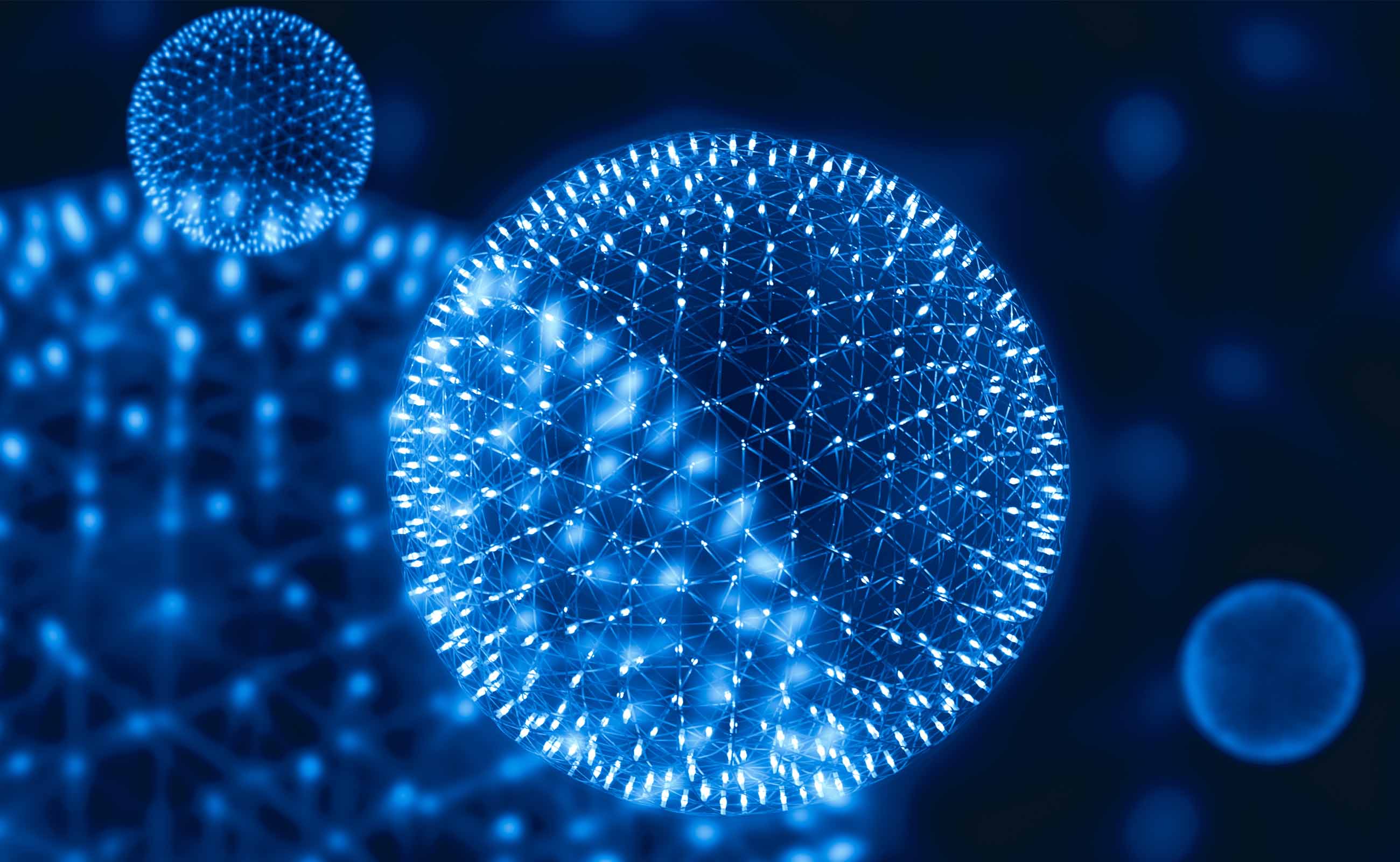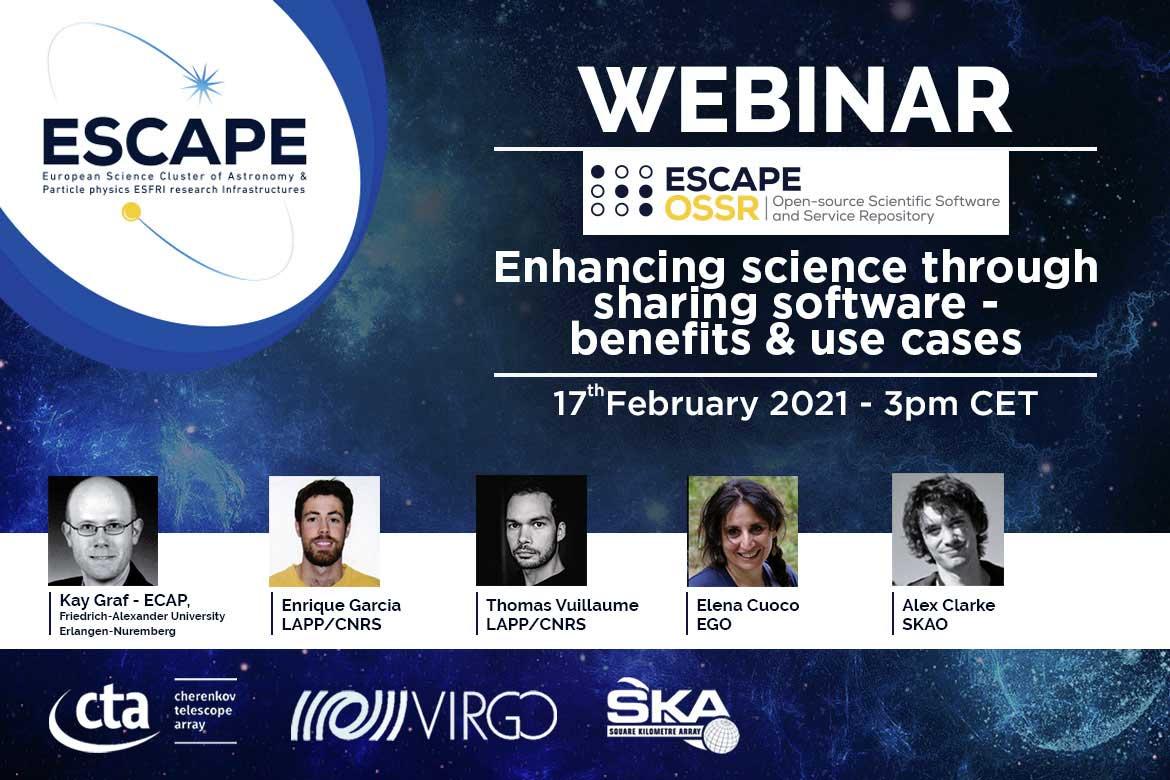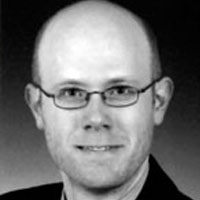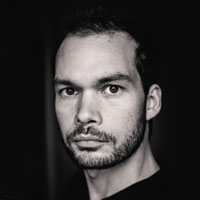
Feb 17, 2021 to Feb 17, 2021
|
ESCAPE events

When: 17th February 3pm CET
The ESCAPE OSSR (Open-source Scientific Software and Service Repository) is a service from ESCAPE EOSC (European Open Science Cloud) thematic cell, a cross-border and multidisciplinary virtual research environment of ESFRI (European Strategy Forum on Research Infrastructures) projects in the astro- and particle physics domain.
ESCAPE OSSR collects software and related services for open science data-analysis of the ESFRI facilities. The co-development of guidelines and best practices in the full software lifecycle within the regime of multi-messenger data analysis promotes activities for innovative methods, aims to maximise software re-use and co-development in order to facilitate e.g. the development of data mining tools and new analysis techniques. It supports an open environment to guarantee cross-fertilisation and to develop community-specific software services that will be exposed under the EOSC catalogue of services under the FAIR principles.
The main benefit of ESCAPE OSSR is a sustainable open-access repository to collect and share scientific software, digital libraries for data analysis, data-sets and, in general, open science products with the scientific community. The repository itself will be enriched with user-support documentation and tutorials, which will be dynamically enhanced by ESCAPE ESFRI projects and accompanied by training activities.
In the webinar "ESCAPE OSSR Enhancing science through sharing software - benefits & use cases" we will show the ESCAPE OSSR developments and achievements towards a FAIR multi-messenger data-driven cooperative approach. Exemplary benefits of OSSR integration in astro-particle-physics and adjacent scientific fields field will be presented by ESFRI experts focusing on cross-community software developments, workflows for scientific re-use of data challenges, and the exploration of scientific data with innovative techniques.
Who should attend?
Agenda
Speakers
 Kay is senior researcher at the Erlangen Centre for Astroparticle Physics (ECAP) at the University of Erlangen, Germany (FAU) and the general manager there. His research is in the field of astroparticle physics spanning the high-energy physics and astrophysics communities. In addition, he has a long history in software development, coordination and maintenance as the computing and software coordinator for the KM3NeT neutrino experiment, an ESFRI. Kay was a member of the EOSC Architecture Working Group, primarily in regards to his work within the EOSC cluster project ESCAPE - where he coordinates the work package on an open science software and service repository (OSSR). OSSR will be a sustainable open-access repository to share scientific software and services to the science community and enable open science. It will house astro-particle-physics-related scientific software and services for data processing and analysis, as well as test data sets, user-support documentation, tutorials, presentations and training activities.
Kay is senior researcher at the Erlangen Centre for Astroparticle Physics (ECAP) at the University of Erlangen, Germany (FAU) and the general manager there. His research is in the field of astroparticle physics spanning the high-energy physics and astrophysics communities. In addition, he has a long history in software development, coordination and maintenance as the computing and software coordinator for the KM3NeT neutrino experiment, an ESFRI. Kay was a member of the EOSC Architecture Working Group, primarily in regards to his work within the EOSC cluster project ESCAPE - where he coordinates the work package on an open science software and service repository (OSSR). OSSR will be a sustainable open-access repository to share scientific software and services to the science community and enable open science. It will house astro-particle-physics-related scientific software and services for data processing and analysis, as well as test data sets, user-support documentation, tutorials, presentations and training activities.
 Enrique Garcia is a Data Scientist at LAPP/CNRS (Annecy, France), working for the ESCAPE and the CTA projects. Within the former, he is participating in the technical implementation of the Open-source Scientific Software and Service Repository (OSSR) since his arrival to LAPP, on July 2019.
Enrique Garcia is a Data Scientist at LAPP/CNRS (Annecy, France), working for the ESCAPE and the CTA projects. Within the former, he is participating in the technical implementation of the Open-source Scientific Software and Service Repository (OSSR) since his arrival to LAPP, on July 2019.
 Thomas is a research engineer at LAPP, CNRS and focuses on developing analysis pipelines for the Cherenkov Telescope Array. He is responsible for the real-time analysis for the first telescope built on-site (the LST-1) and principal investigator of the GammaLearn project which develops novel approaches using deep learning for the event reconstruction. In ESCAPE, he is responsible for setting-up the Open-source scientific Software and Service Repository.
Thomas is a research engineer at LAPP, CNRS and focuses on developing analysis pipelines for the Cherenkov Telescope Array. He is responsible for the real-time analysis for the first telescope built on-site (the LST-1) and principal investigator of the GammaLearn project which develops novel approaches using deep learning for the event reconstruction. In ESCAPE, he is responsible for setting-up the Open-source scientific Software and Service Repository.
 Member of LIGO Virgo Collaboration.Head of Data Science Office at European Gravitational Observatory, since March 2018 Associate Faculty at Scuola Normale Superiore. Main proposer of the COST action “A network for Gravitational Waves, Geophysics and Machine Learning” (www.g2net.eu), which was financed by COST association. Elena is also Cost Action 17137 chair. ESCAPE (https://projectescape.eu/) General Assemby chair.
Member of LIGO Virgo Collaboration.Head of Data Science Office at European Gravitational Observatory, since March 2018 Associate Faculty at Scuola Normale Superiore. Main proposer of the COST action “A network for Gravitational Waves, Geophysics and Machine Learning” (www.g2net.eu), which was financed by COST association. Elena is also Cost Action 17137 chair. ESCAPE (https://projectescape.eu/) General Assemby chair.
 Alex is a regional centre scientist at the SKAO, looking at data processing and analysis workflows for the SKA. His background is in observing radio galaxies and clusters, and using machine learning to classify sources in surveys.
Alex is a regional centre scientist at the SKAO, looking at data processing and analysis workflows for the SKA. His background is in observing radio galaxies and clusters, and using machine learning to classify sources in surveys.

Except where otherwise noted, content on this website is licensed under a Creative Commons Attribution 4.0 International License.